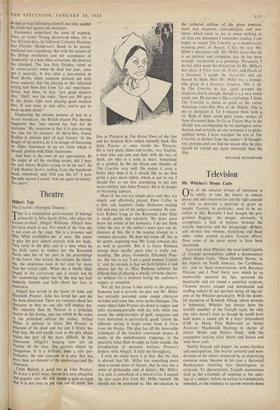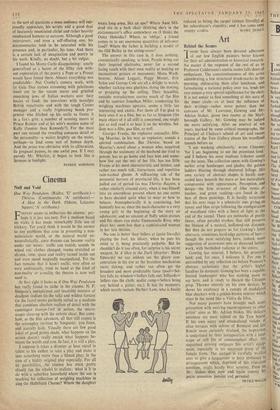Television
Mr. Whicker's Monte Carlo ONE of the securest virtues of television is its ability to take the viewer to remote places and odd situations for just the right amount
of time to provoke a question or grant an insight. Tonight, in particular, used to be ex-
cellent at this. Recently I had thought the pro-
gramme flagging: the danger, obviously, is scrappiness, a lack of balance between the socially important and the intriguingly off-beat, and retreats into whimsy, skylarking and those other rather painful in-jokes Tonight affects. Now some of the poise seems to have been recovered.
Last week Alan Whicker, the most indefatigable of Tonight personalities, added a documentary
about Monte Carlo, 'These Humble Shores,' to his reports on South America, the Caribbean, etc., and to those conversations with Baroness Thyssen and J. Paul Getty over which he so memorably smacked his lips, quivered his moustache and yet raised a quizzical eyebrow, l'homme moyen sensuel and newshound and scoffing radical (if not puritan) being all ingredi- ents of the Whicker personality. With the doubt- ful exception of Kenneth Allsop, whose persona is bohemian, Whicker has always been the worldly member of the Tonight team, the only one who doesn't look as though he could have held down a sound job in a boys' prep-school (Cliff as Head, Fyfe Robertson as Senior Assistant, Macdonald Hastings in charge of Junior Maths and Nature Study, with ' the youngsters looking after Sports and Scouts and what have you).
Nattily dressed and dapper, he seems classless and metropolitan. The boyish curiosity and won- derment of the others, tempered by an underlying common sense, become in his case a rhetorical flamboyance resolving into knowingness or cynicism. To characteristic Tonight mannerisms such as the crescendo of suspense at the well- ing of a. subject, before its nature is triumphantly revealed, or the tendency to narrow interest down
to the sort of questions a mass audience will sup- posedly appreciate, his scripts add a good deal of lusciously enunciated clich6 and rather heavily emphasised humour or sarcasm. Although a good interviewer, and even a self-effacing one, his documentaries tend to be saturated with his presence and, in particular, his tone. And there is a certain lack of imagination and poetry to his work. Kindly, no doubt, but a bit vulgar.
I found his Monte Carlo disappointing: sourly generalised as a haunt of the filthy rich with- out exploration of the poetry a Pope or a Proust would have found there. Almost everything was predictable: Nat Crosby's camera work, with its Gala Day statues streaming with gelatinous tinsel cut to the vacant stares and grizzled munching jaws of Italian workers over their basins of food; the interviews with nostalgic British expatriates and with the tough Casino manager and a really frightening beach pro- prietor who hitched up his smile to freeze it in a fox's grin; a, number of seeming sneers at Prince Rainier and at his wife's maiden name of Kelly (funnier than Kennedy?). For the most part one missed the revealing sensuous detail or the personality—a waiter brightly on the make, -perhaps—to lend some sort of human depth. And the prose was obtrusive with its alliteration, its pregnant pauses, its one awful pun. If I may parody Mr. Whicker, it began to look like a Sermon in Sunlight.
PATRICK ANDERSON



































 Previous page
Previous page